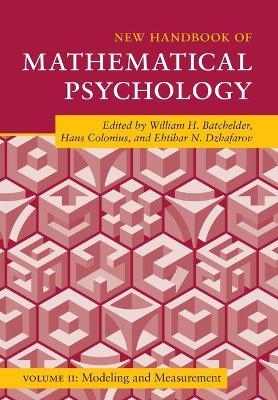
New Handbook of Mathematical Psychology: Volume 2, Modeling and Measurement
Cambridge University Press (Verlag)
978-1-009-04540-7 (ISBN)
The field of mathematical psychology began in the 1950s and includes both psychological theorizing, in which mathematics plays a key role, and applied mathematics motivated by substantive problems in psychology. Central to its success was the publication of the first Handbook of Mathematical Psychology in the 1960s. The psychological sciences have since expanded to include new areas of research, and significant advances have been made in both traditional psychological domains and in the applications of the computational sciences to psychology. Upholding the rigor of the original Handbook, the New Handbook of Mathematical Psychology reflects the current state of the field by exploring the mathematical and computational foundations of new developments over the last half-century. The second volume focuses on areas of mathematics that are used in constructing models of cognitive phenomena and decision making, and on the role of measurement in psychology.
William H. Batchelder is Professor of Cognitive Sciences at the University of California, Irvine. Hans Colonius is Professor of Psychology at Carl V. Ossietzky Universität Oldenburg, Germany. Ehtibar N. Dzhafarov is Professor of Psychological Sciences at Purdue University, Indiana.
1. Stochastic methods for modeling decision making Adele Diederich and Keivan Mallahi-kara; 2. The diffusion model of speeded choice, from a rational perspective Matt Jones; 3. Stochastic foundations of elementary mental architectures Joseph W. Haupt, James T. Townsend and Brett Jefferson; 4. Identifiability of probabilistic models, with examples from knowledge structure theory Jean-Paul Doignon, Jurgen Heller and Luca Stefanutti; 5. Quantum models of cognition and decision Jerome R. Busemeyer and Peter D. Kvam; 6. Computational cognitive neuroscience F. Gregory Ashby; 7. Discovering aggregation properties via voting Donald G. Saari; 8. Categorization based on similarity and features: the Reproducing Kernel Banach Space (RKBS) approach Jun Zhang and Haizhang Zhang; 9. The axiom of meaningfulness in science and geometry Jean-Claude Falmagne, Louis Narens and Christopher Doble.
| Erscheinungsdatum | 07.06.2021 |
|---|---|
| Reihe/Serie | Cambridge Handbooks in Psychology |
| Zusatzinfo | Worked examples or Exercises |
| Verlagsort | Cambridge |
| Sprache | englisch |
| Maße | 170 x 244 mm |
| Gewicht | 840 g |
| Themenwelt | Geisteswissenschaften ► Psychologie ► Test in der Psychologie |
| Mathematik / Informatik ► Mathematik | |
| ISBN-10 | 1-009-04540-7 / 1009045407 |
| ISBN-13 | 978-1-009-04540-7 / 9781009045407 |
| Zustand | Neuware |
| Haben Sie eine Frage zum Produkt? |
aus dem Bereich


